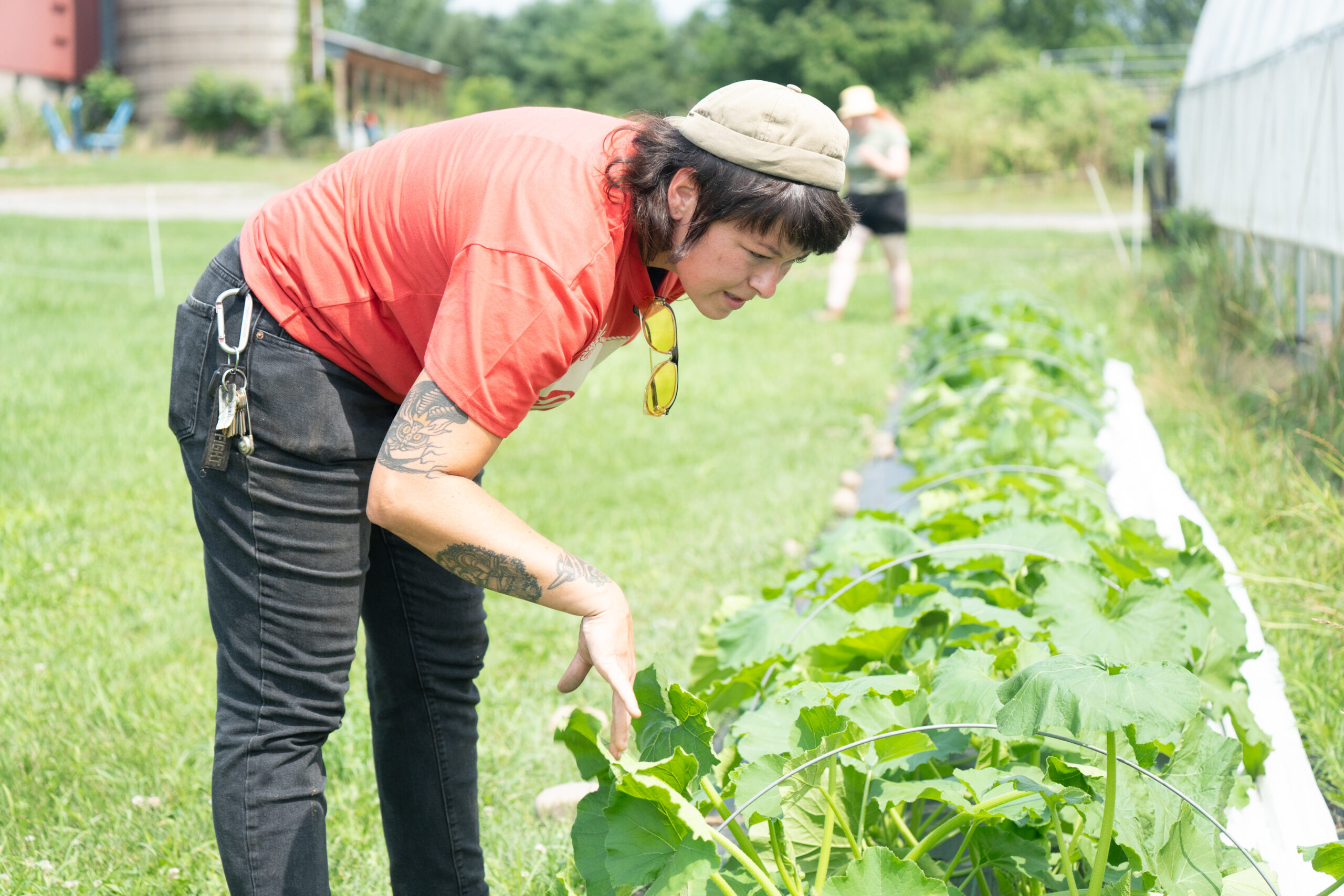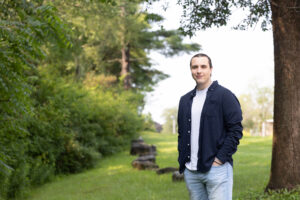Updated August, 16 2024
Internships and applied learning opportunities help turn college success into career success. Internships allow students to explore their field more deeply, get real-world experience that employers value, and make connections that can lead to new opportunities.
Across the state, SUNY is working to ensure that every undergraduate student has access to an internship or research experience before graduation. With programs like the SUNY Climate Corps, the Veterans Enrollment and Support Internship Program, and the Brooklyn Public Library Internship Program, SUNY is focused on providing life-changing opportunities.
While these pathways provide new chances to learn, our students are already hard at work discovering their passions. From teaching children about the galaxy at a NASA space camp, to running an organic farm, read on to see what kind of internships SUNY students are experiencing.
Exploring climate change
It might have been an unconventional path, but Collyn Dungey’s journey led him to discover his passion. After graduating as part of Tompkins Cortland Community College’s (TC3) Class of 2024, he is pursuing a prestigious summer research internship before starting at SUNY ESF this fall, to pursue a degree in environmental resources engineering.
With encouragement from Professor Kelly Wessell, Dungey applied for and was selected to the Lamont-Doherty Earth Observatory Internship Program at the Columbia University Climate School, where he is spending the summer assisting on research that looks at the effect of climate change on the calcification of oyster shells.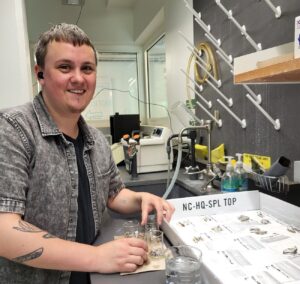
He says the connections he made with people like Professor Wessell are what made his time at TC3 so special. “Kelly Wessell has been an inspirational professor and mentor to me,” said Dungey. “I could not have asked for a more motivating and thought-provoking instructor. He always took the time to go in-depth on topics I was curious about, and his discussion-based approach to learning kept my curiosity going even after the classes ended. He has challenged me to be the best student.”
Challenge accepted, as Dungey excelled and found his calling in biology and ecology. But it wasn’t always easy, especially having been out of school for nearly a decade. “It was a challenge to re-learn how to be an effective student,” he said. “When I made the decision to go back to school, I knew I wanted to start out at a community college, with small class sizes so that I could form connections with faculty and fellow students.” He started with an online class, and when that went well, came for a tour of campus and knew TC3 would be a good fit. Along the way, he discovered an advantage of being a non-traditional student – he was able to rely on prior life experience to help organize his time and priorities. “I figured out a routine that worked for me, and focused on taking advantage of every opportunity I was presented.”
After the research opportunity concludes, it’s off to SUNY ESF, where Dungey will continue to pursue his passion. “I am grateful for the sense of direction that I found at TC3.”
Finding a career to help others
Patrick Rosenberger, currently pursuing a Masters of Social Work at the University at Buffalo, completed the first social work field placement at the Buffalo Employment and Training Center (BETC) since the site refreshed its internship program under new leadership.
“I have discovered a love for macro-level social work and will look for ways to continue to impact more people wherever I can.” – Patrick Rosenberger
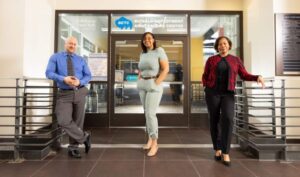 BETC is a comprehensive career center funded by the federal Workforce Innovation Opportunity Act and managed by Workforce Buffalo, the second largest workforce board in the state. A pair of UB alums, Dixie Farr, MSW ’14, and Jacqueline Hall, DSW ’24, MSW ’05, worked together to develop a field experience that offers a structured and supportive learning environment for students at the BETC.
BETC is a comprehensive career center funded by the federal Workforce Innovation Opportunity Act and managed by Workforce Buffalo, the second largest workforce board in the state. A pair of UB alums, Dixie Farr, MSW ’14, and Jacqueline Hall, DSW ’24, MSW ’05, worked together to develop a field experience that offers a structured and supportive learning environment for students at the BETC.
“When I was contemplating my active-duty time in the military, I realized that the highlights of my career involved helping people,” says Rosenberger. “I started job searching at the tail end of my most recent National Guard mobilization and discovered that there were several open social worker positions at the Buffalo VA. Social work appeared to offer a chance to not only help people in general, but especially my fellow veterans.”
Rosenberger’s timing was serendipitous. When he started his classes at UB, the BETC had finally received permission to relaunch its internship program, and he was matched with the organization.
As part of his field experience, Rosenberger helped BETC to expand its services for individuals seeking to enter the workforce or advance in their career.
Farr specifically encouraged Rosenberger to focus on self-care activities with the BETC staff. Since the center is the lynchpin between employers and job seekers, she says the team must maintain high energy to be the resource the region needs. Rosenberger appreciates how his BETC experience has helped him understand more about using a trauma-informed approach to social work and assisting his clients to manage any roadblocks they encounter. He especially enjoyed the virtual reality workforce training suite of exercises that simulate real-life job situations.
“The VR program can guide users through real-world tasks, such as how to use tools like a mechanic, engage with a customer or stack boxes,” he says. “Currently we use this with our youth clients, but eventually the BETC would like all customers to be able to use the system because it is incredibly valuable in managing choice paralysis.”
“I’ve learned that there is no single approach to helping someone. Taking the time to understand your client is critical,” Rosenberger continues. “For instance, a veteran may not understand how their skills from deployment can contribute to a more traditional job setting, while a justice-impacted individual might be able to start some skills training at a correctional facility and be ready for more advanced assistance when they arrive.”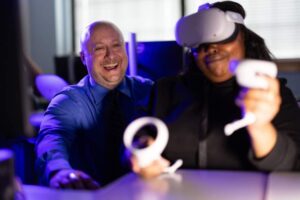
Rosenberger says his long-term plan is to serve the veteran community in some capacity after graduation.
“I don’t know if I will follow Jackie with earning another degree,” he says, “but I have discovered a love for macro-level social work and will look for ways to continue to impact more people wherever I can.”
Living and learning in the nation’s capital
As part of the SUNY Washington Internship Program, SUNY Oneonta senior Annalisa Alicea, a dual Sport Management and Communication Studies major from Poughkeepsie, New York, spent her summer in Washington, D.C. getting firsthand experience in not one but two areas of interest.
“Stepping outside my comfort zone initially felt daunting, but it has opened doors to incredible experiences and relationships that have shaped me both personally and professionally.” – Annalisa Alicea
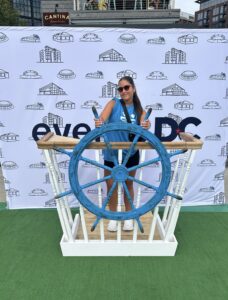 Four days a week, Alicea interned at Destination DC, the official marketing organization for Washington. Serving as a Sports and Events intern, she helped research and craft bid proposals for new events, sourced hotels and created room blocks for upcoming events, updated databases and sports sales dashboards and supported experiential marketing campaigns. A perk was being able to attend big games and events such as the Argentina vs. Guatemala Copa America warm-up match, USA Rugby vs. Scotland, and the Citi Open.
Four days a week, Alicea interned at Destination DC, the official marketing organization for Washington. Serving as a Sports and Events intern, she helped research and craft bid proposals for new events, sourced hotels and created room blocks for upcoming events, updated databases and sports sales dashboards and supported experiential marketing campaigns. A perk was being able to attend big games and events such as the Argentina vs. Guatemala Copa America warm-up match, USA Rugby vs. Scotland, and the Citi Open.
“Working at DDC has not only deepened my understanding of the sports industry but has also provided invaluable insights into the business aspects of event planning,” Alicea said. “DDC has offered me an incredibly holistic experience, allowing me to observe global and convention sales processes, marketing and communications strategies, and the dynamics of partnerships and alliances.”
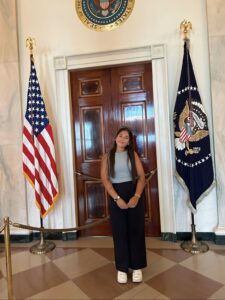 Every Friday, she joined fellow SUNY Washington interns for seminar classes, where they engaged with speakers on a variety of topics and toured the city, visiting the White House and Supreme Court, attending Congressional and Senate hearings and getting to meet with renowned think tanks like the Leadership Conference on Civil and Human Rights.
Every Friday, she joined fellow SUNY Washington interns for seminar classes, where they engaged with speakers on a variety of topics and toured the city, visiting the White House and Supreme Court, attending Congressional and Senate hearings and getting to meet with renowned think tanks like the Leadership Conference on Civil and Human Rights.
Some of Alicea’s favorite experiences included being able to meet and get advice from SUNY Washington alumni who now work for congressmen, senators and more. Hearing about their career paths, both the highs and lows, was “extremely valuable,” she said.
“Reflecting on what I will take away from this experience is challenging because I feel profoundly transformed,” Alicea said. “Professionally, I’ve acquired a variety of new skills and knowledge that I’m eager to continue developing. Personally, living independently in a city far from home has nurtured my confidence and independence.”
Flexing a green thumb
Call it a labor of love.
When Kate Bolen traded in her career as an insurance company fraud and abuse investigator for a hands-on education digging in dirt, planting vegetables and caring for grow pods filled with seeds, she unearthed a fulfilling new career.
The SUNY Morrisville horticulture business management bachelor’s degree student is putting her green thumb to work this summer as an intern at SUNY Morrisville, running its Four Seasons Organic Farm, as well as assisting with a Controlled Environment Agriculture (CEA) seed regeneration project with the United States Department of Agriculture (USDA) Agriculture Research Service (ARS).
The college’s Four Seasons Organic Farm is a certified organic farm which provides students with a hands-on educational experience through year-round crop production.
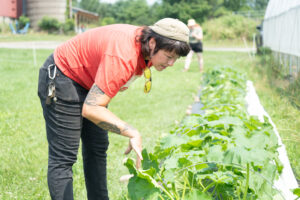 “This is my first time running a farm,” Bolen, a Solvay resident, said. “I am learning more than I ever would have imagined — from seed to sale.”
“This is my first time running a farm,” Bolen, a Solvay resident, said. “I am learning more than I ever would have imagined — from seed to sale.”
The farm produces dozens of varieties of vegetables and fruits year-round. Spring brings leafy greens and lettuce, all planted in a high tunnel in the chill of winter. Summer brings warm-weather crops followed by pumpkins and other winter vegetables in the fall.
Inside one of the college’s high tunnels, a summer crop will deliver cucumbers, herbs, radishes, beets, beans, bok choy, chard and more, all grown by students in horticulture labs. Growing outside are potatoes, onions, celery and eggplant.
Bolen’s sowing another dimension of skills with flowers, keeping a watchful eye on a dahlia greenhouse, too. The colorful blossoms will be used in the college’s floral design class.
Working alongside Bolen is Ella Williams, a horticulture business management bachelor’s degree student, hired for the summer, and Lucy Dixon ’24, an instructional support associate in the college’s Horticulture Department.
A mid-July harvest of German white garlic, notorious for its large heads and cloves, brought them all together for an early morning start to avoid the afternoon heat.
“This internship has been the best experience I’ve had thus far in my education at Morrisville.” – Kate Bolen
After they pulled all of the garlic, they transported it to the college’s Four Seasons Farm Dairy and Specialty Crops Incubator where it will be cured and later cut up for use and sale. In past years, annual crops have been utilized in the dining facility and Copper Turret, college-run restaurant, while others were sold in the community.
A lot goes into keeping the farm going, but the fruits of Bolen’s labor, evident in a radiant smile, are well worth it.
“We did it all by hand this year with a hoe, shovel and elbow grease,” Bolen said. “I really love this work and what I am doing.”
For Bolen, the summer internship is solidifying her career choice and giving her invaluable experience and confidence. “Every class I’ve taken so far has prepared me in a multitude of ways, all of which ensure I have both the capability and the confidence to run a farm.”
The work isn’t all about growing crops. Bolen’s also learning about handling pests — insects and animal that threaten their growth, as well as putting in irrigations systems. And she’s learning how to solve problems.
“You really have to learn how to engineer things too,” Bolen said. “It’s also problem solving on the fly. I realize that I am a very proficient problem solver.”
The non-traditional student was looking for something new when she left her career and chose to go with a green one.
“I had friends who spoke highly of the horticulture program. I knew I wanted to do something hands-on with plants and this was the place,” she said about SUNY Morrisville. “It’s the most hands-on, satisfying job. I love turning what we have grown into a meal.”
Bolen got her start in the college’s specialty crops & cannabis production certificate program. The certificate is stackable and allows students to seamlessly transfer into other degree programs, including the A.A.S. horticulture and B.Tech. horticulture business management degrees, making it possible to earn multiple credentials.
“I started in the cannabis certificate track and found myself far too invested in learning everything, so I decided to switch to the four-year program,” Bolen said. “We have something unique here at Morrisville. Everyone is so generous with their time and their knowledge and it’s given freely to those with the enthusiasm to learn.”
Bolen’s eagerness to learn more has her hands in a new project with the USDA ARS.
In the spring semester, students were given the opportunity to run three different seed regeneration trials congruently, growing hemp seed, micro tomato seeds and cabbage seeds, in the CEA grow pod at the specialty crops kitchen.
“These seeds may find themselves dispensed all over the world,” Bolen said. “We’ve been hand-pollinating cabbage flowers every other day since mid-June.”
CEA is an advanced and intensive form of hydroponically agriculture where plants grow in a controlled environment to optimize horticultural practices. It takes a wide range of skills like knowledge of chemistry, horticulture and more to operate a successful CEA production.
“I hope we can continue working with the USDA,” Bolen said. “I believe it provides a wonderful opportunity to connect students to potential job opportunities in science and horticulture. It’s important work to be involved with.”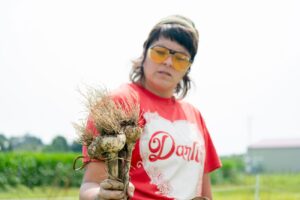
Bolen is mastering a variety of skills which have been helpful in planting a small farm at home, where she specializes in herbs for hot sauces and kitchen spices. She also hopes to build a small greenhouse and implement four-season farming there.
“This internship has been the best experience I’ve had thus far in my education at Morrisville,” Bolen said. “The horticulture program has provided an array of different classes, each touching upon different aspects of the industry.”
Many of SUNY Morrisville’s academic programs culminate in an internship, an integral part of students’ educational experiences.
Teaching the next generation
For University at Albany rising junior Abby Greco, trying to explain Albert Einstein’s theory of relativity to a group of 9-year-olds was not at the top of her summer plans this year. But getting the opportunity to teach children how to build rockets amid a Saturn V or showing off the Apollo 16 space capsule is another story entirely.
Greco is spending her UAlbany summer working as a counselor at Space Camp, where she is teaching children about the history of the U.S. space program, including the Mercury, Gemini and Apollo missions, as well as the space shuttle program, Artemis and commercial space flight missions.
And yes, Greco is also tasked with teaching her 9-to-14 year-olds how to build rockets that they later launch.
“While I’m not necessarily learning equations and doing research, I am learning a lot of soft skills while working here,” said Greco, a physics major from Pawling, N.Y. “Time to travel between activities fluctuates, so time management is crucial. Then there’s also the obvious one, which is being able to properly convey the concepts. The 9 year olds take a little longer to wrap their heads around the vastness of space and rocket propulsion than the 14 year olds do. But they are kids at camp too, so we have to make sure they’re having fun while learning.”
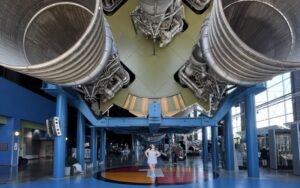 Situated on the grounds of the U.S. Space & Rocket Center in Huntsville, Alabama, Space Camp has served as the summer home for nearly 1 million children since it first opened in 1982.
Situated on the grounds of the U.S. Space & Rocket Center in Huntsville, Alabama, Space Camp has served as the summer home for nearly 1 million children since it first opened in 1982.
“The Redstone Arsenal, where a lot of the early rockets were developed, is right in our backyard, and Marshall Space Flight Center is about 3.5 miles away,” said Greco, pointing to the ongoing work underway to develop the rockets for NASA’s Artemis program.
Not that they’re aren’t drawbacks to spending a summer in the southern United States.
“The weather is HOT compared to New York. The Rocket Center’s security has it’s own process when it comes to sending out weather alerts to the staff, and we get notifications whenever the heat index is above 100 degrees Fahrenheit, which has been pretty much daily,” said Greco. “Fortunately, the summer camp is education based, so we don’t do a lot outside. All the mission simulations, astronaut simulations, history lessons, rocket construction sessions, etc., are all indoors.”
Of course, when it comes to launching their model rockets, the students will be headed outdoors.
“The soft skills that I’m learning now take experience in order to keep building them. Eventually I’m going to have to communicate the science I’m doing, and I need to be able to do it well.” – Abby Greco
For Greco, working at Space Camp was an opportunity to gain career skills while also checking off a box for both her and her mother. It started when she picked up stargazing as a hobby at the start of the COVID-19 pandemic, with her rural hometown of Pawling providing plenty of clear night skies. After enjoying a “Star Wars” marathon with her dad and two brothers around the same time, Greco really became interested in a career that involved the study of space. This is what first led her to consider UAlbany (her father’s alma mater) for her collegiate studies.
“I attended the natural science student panel where a physics student discussed a dark matter experiment he was working on. He was using particles to trigger phase changes in supercooled and superheated liquids. I found that absolutely fascinating and wanted to be a part of it,” Greco said. She went on to join the UAlbany Dark Matter group in fall of 2023 with associate professors Cecilia Levy and Matthew Szydagis, who ended up visiting Abby in Huntsville while coincidentally at a conference there.
“It was great to see Abby gaining experience helpful for her future,” said Szydagis.
“In addition to doing research in my group, I had Abby in my modern physics class last year and introduced her to Einstein’s special relativity,” said Levy. “The fact that she is already using this knowledge and sharing it with the next generation is simply wonderful. Knowing Abby and her never failing enthusiasm, I am sure she is already positively influencing some of these young minds to become future physicists.”
As Greco began reviewing her options for continuing her studies this summer, it was her mom’s suggestion to explore an out-of-this-world way to advance her education while getting paid to do so.
“My mom had always talked about Space Camp and how she could never go. I was just going to go home and work as a counselor at the local summer camp anyway, so I figured I’d find a camp that was related to what I want to do. If I do want to become a teacher or conduct research, Space Camp would be the perfect opportunity to advance those skills,” said Greco. “I applied, got an interview, and got hired on the spot.”
Greco credits both of her parents, but her mom in particular, with encouraging her to take risks on pursuing her life goals. “She is incredible and almost everything that I have learned about advocating for myself has been from her,” said Greco.
As for what comes next, Greco hasn’t completely decided. But her fascination with space has her leaning toward a PhD program in close proximity to one of the Event Horizon Telescopes situated around the globe. These observatories collaborated in 2019 to produce the first images of light trapped around supermassive black holes.
“The soft skills that I’m learning now take experience in order to keep building them,” said Greco. “Eventually I’m going to have to communicate the science I’m doing, and I need to be able to do it well.”
Between what she is learning at Space Camp and her studies at UAlbany, including her recent election as president of the UAlbany physics club, she is well on her way to mastering the skills she needs to succeed in a scientific career.
Influential experience
Beginning with his first year in elementary school, Kaustubh Sathe was exposed to frequent change. His father’s job necessitated that Kaustubh and his family move every two years. Growing up in Mumbai, India, Kaustubh learned to adapt to change and by the time he was ready for graduate school, he came to embrace and look forward to new challenges and opportunities. Kaustubh searched for the best engineering and research university in the US, both for research superiority and affordability, and that led him to Stony Brook University (SBU). He was also drawn to the diversity SBU offered and he instantly felt at home on its campus.
“I would recommend that all students should get this real-world applications experience. SPIR is also helping startups and small businesses around Long Island – a win-win all around – students get nice experiences to put on their resumes, and companies get technically sound students as interns.” – Kaustubh Sathe
One of Kaustubh’s earliest experiences at SBU was applying to work on a project through the SUNY Strategic Partnership for Industrial Resurgence (SPIR) program. Kaustubh was matched with a start-up company, Odyne Corporation, that developed a novel battery technology that they were implementing to retrofit diesel-fueled buses with hybrid electric chassis. The company was small enough that Kaustubh got to participate in all aspects of the company’s engineering tasks including cabling, working on the production floor, helping to design microprocessors and back-end software, and the installation and maintenance of the engines and batteries. The company’s first test bus was incorporated into SBU’s transportation fleet and was driven on the campus bus routes. Kaustubh rode the bus around the west campus loop to test the technology and performance, validate the data, and subsequently refine and optimize the performance of the hybrid-electric bus.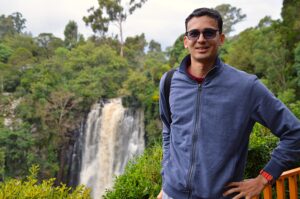
Kaustubh found that he faced two challenges at SBU. The first was being on his own in a foreign country. The second challenge was learning to adapt to the teaching style in the US. He found that applied learning was the focus in both in his classes at SBU and through his SPIR internship. Students are encouraged to work within groups, to ask questions, and through discovery, learn how to apply the knowledge to practical, real-world problems. Kaustubh found this fascinating and exciting. Professors Petar Djuric and Thomas Robertazzi, both from Electrical and Computer Engineering (ECE), were incredibly important in Kaustubh’s academic journey. The professor who had the most impact was Dr. John Murray, retired from ECE, who helped Kaustubh get his first job at Cummins.
Reflecting on this experience with the SPIR program, Kaustubh shared, “My internship was a very integral part of my degree at SBU. It helps apply learnings in the real world. I would recommend that all students should get this real-world applications experience. SPIR is also helping startups and small businesses around Long Island – a win-win all around – students get nice experiences to put on their resumes, and companies get technically sound students as interns.”
Learn more about the Strategic Partnership for Industrial Resurgence (SPIR)
The SPIR program is a SUNY program that provides funding to help New York companies solve engineering and technical problems using SUNY resources, including access to students, faculty, and specialized facilities.


